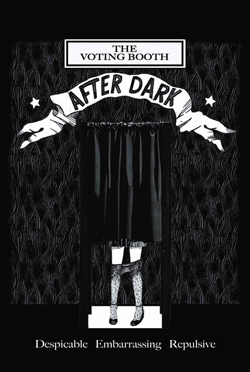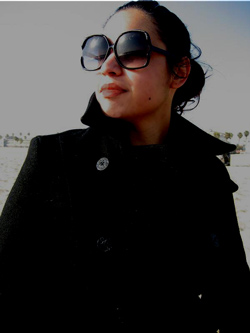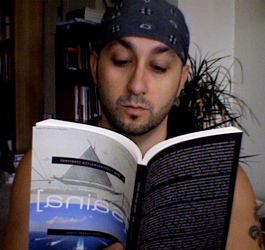
The Voting Booth After Dark: Despicable, Embarrassing, Repulsive (Fiat Libertad Co., 2009).

The Voting Booth After Dark: Despicable, Embarrassing, Repulsive (Fiat Libertad Co., 2009).
First Book Interview: Vanessa Libertad Garcia by Craig Santos Perez
Who are you?
I'm a Cuban-American lesbian writer & filmmaker. Probably the boxes that best succinctly summarize me as of right now.
Where do you come from?
I was born & raised in Los Angeles, California by a Cuban family.
How did you become interested in writing?
Writing has always been an integral part of me. Sort of like going to the bathroom, drinking water, and loving my mother. I began scribbling faux words when I was 4 in anticipation of when I could actually write real words. I've kept journals from age 13 through now age 27. Writing has always been an instinctive part of my survival and sanity. When I write I feel more centered, clearer, and whole.
How did this particular project—with such a wonderful title, The Voting Booth After Dark: Repulsive, Embarrassing, Despicable come into being?
I'm honored you like the title! Thanks. In the years following college I'd written a couple of poems & fictional short stories based on my despicable, embarrassing, & repulsive experiences in LA's Eastside nightlife. When 2008 rolled around I wrote a whole score more—elaborating on characters from this lifestyle & their emotional reactions to the momentous & historical 2008 presidential race. They lived the voting booth after dark. At the time, I'd written a feature screenplay titled Dear Dios whose protagonists are, like the book's, based on the characters from this club scene. The film, however, was stuck in the "finding a right producer" stage. Burnt out on the hustle & grind of the movie biz, I yearned to express myself through an artistic outlet that was simple, direct, raw—not wrapped up & dependent on so much business to come alive. One of my best friends, and gifted theatre actress, Baby Dewds (Danielle O'Terry) suggested I compile my short stories & poetry into a zine, which anyone could easily access and enjoy. Thus The Voting Booth After Dark: Despicable, Embarrassing, Repulsive was born.
What struggles did you have as an independent publisher?em>
I think that the biggest struggles I've faced as an independent publisher have to do with affording/paying for materials—buying books in bulk, mailing out review copies, printing business cards & flyers, etc. For example, I've been aching to get my book converted into an e-book, and make it available for a multitude of apps, but I just haven't had the money. Usually I'd go to a tech savvy artist friend & they'd help me do it or figure it out, but e-books are a new world & they're intricate little specimens that require specialized tweaks for different compatibilities. I think it's a common artist struggle—working a part-time b-job so that I can spend the hours I need creating and finish projects, yet not making enough money to push them forward into the material world as quickly as I'd like. Right now, I'm saving up little by little to invest in an e-book conversion.
What joys?
Sooooo many joys! In my experience, the joys of being an independent publisher far outweigh the struggles. First of all, creatively I got to let loose, truly explore & experiment in whatever ways I desired. Then I got to entrust people—whose sensibilities and opinions I respect and am challenged by—with the crucial editing process. For example, my editor Brit Lauren Manor has an intuition, a knack for knowing where I'm going with the whole project & its individual pieces, and her constructive feedback deepens the approach I take to revamping a poem, short story, essay, screenplay. I loved creating with just the right type of no & yes people—the ones my gut instinct chose. Also, I loved realizing that I can do all of it–creating a book, publishing it, marketing it, guiding it into the world—and all I have to do is educate myself and apply what I've learned. I use to think that creating and publishing, and promoting a book was a secret magic only special "chosen" people could perform. Nope! The film industry taught me better. If I can make I movie, I can make a book! Let's get to work. All the information a person needs for doing such things is out in the world for our consumption. Just soak up the info and apply. If one strategy doesn't work, try another strategy, and if that doesn't work try a hybrid strategy made of both, etc. The only difference between those that do and those that don't is how willing they are to troubleshoot. That's my subjective opinion, of course!
Has it been difficult marketing your own work?
At the beginning marketing my own work was excruciatingly scary and overwhelming. I've always thought of marketing as the art of selling people things they don't want or need, which is why there's so much successful junk in the mainstream. I perceived marketing to be a vapid soulless industry, and felt like a monster when "marketing" myself and my work to others. Somewhere down the line, however, I realized I was looking at marketing all wrong! It's an art form! ... and like any artistic work you can approach it from a spiritual or egocentric place. You can sell somebody something they don't need or you can offer them something that might give them new insight. Once I changed my perception of it, I grew to love it. I'm extremely grateful for marketing! It affords me the priceless opportunity to offer people an experience I think will move them, comfort the, spark reflection—hopefully in some unforeseen intellectual, emotional, or spiritual way. At some point last year I heard a magnificent personal philosophy that I now too abide by: The job of an artist is to create and make their work available. That's all marketing really is for me—making my work available to people. Seth Godin is a great example of a conscientious marketer! He sees marketing as an opportunity to serve people, not sell to them.
Would you recommend this route for other young writers tired of the hustle and biz of Traditional Dependent Publishing?
I'd definitely recommend this route to anyone. Trust me, it takes much less work to create a quality book, make it available for purchase to millions of people through a phenomenal wide-reaching company like Lightning Source, and market the book to those you'd think would really love, appreciate, & enjoy it than trying to land an agent, then a traditional publishing contract, and then, hopefully, get them to spend some money on marketing your work.
If you're willing and open to learn and apply all that you've learned over and over again until something clicks/works go into indie publishing. If you're looking for fat cats to tell you you're finally a writer, you've been discovered, and you're getting that defining X,Y,Z award—spend the same amount of time x 10,000 more hours and go after a Traditional Publishing Contract.
That's all I know so far! We'll see what else the earth has to teach me about the process of creating art and making it available!
Here are three great resources that helped me decide what E-Book conversion to use:
1) Why, as indie authors, it's imperative that we get our books converted to e-book asap, read this.
2) Great Article on making the "right," a.k.a. individually appropriate, decision for e-book conversion here.
"There’s a huge difference between books that are converted by someone who is paying attention and knows how to manipulate the files to get the best result, and more or less automated conversion that give you whatever comes out the end when you push the 'convert' button." Agreed!
4) There's an awesome & free little 12-page e-book conversion guide by BookBaby (which I chose).
As you mentioned, your book contains short stories and poetry...as well as a more experimental poem written through text messages! Can you tell us a little about how you approach the poems in your work as opposed to the stories. And where the did you get the idea for the text poem?
Such a great question! Well, I tend to do freeform poems—they don't abide by any traditional poetic structure. Poems are an entirely emotional journey for me. Therefore, I tend to pace them & structure them as if my feelings were put to sound. They're like songs—with their own flow & inflections. Spoken word without the speaking. I love writing poetry this way because poetry for me is truly all about expressing—translating the coursing emotions, not explaining them. Therefore, I take a lot of structural liberties in poetry. Such a fun genre with which to experiment.
My short stories, however, undergo a much more intellectually reflective process. Their goals are more so to explain the narrative fueling the poetry's emotion. My short stories reflect upon internal journeys with combined head & heart, and focus on communicating a story as opposed to just expressing its undercurrent of emotions. Although I too love experimenting with short story forms—so much! For instance, I'd like to think of the Text Message Conversation section titled "Hatred" as a cohesive experimentation with both poetry & short story genres. My idea for it came from the unique discourse that takes place on a daily basis between people, between friends through the IM form.
What are you working on next? How can we stay updated on your projects?
My next two projects are my first feature film titled Dear Dios based on the book's characters, and my second book Bloody Fucking Hell—a collection of love poetry.
Dear Dios is about an aspiring photojournalist with a lust for bi-women and malt liquor who spirals out of control in the hipster club scene and turns bottom-of-the-barrel temp for an LA celebrity tabloid rag. You can read more about it and keep up to date with its progress by clicking the tumblr "follow" button on its main page here.
Bloody Fucking Hell is a collection of love poetry & reflective essays that chronicle the splendor, torture, and confusion I experienced as a lesbian falling in love with various "straight" women. It takes an in-depth look at these intimate, rather distinct, relationships and explores where feminine identity, classifications of love, and roles in friendship blur in soul-splitting way.
To keep up to date with all my mischief you can check out my main website—here—which links to twitter, facebook, and my blog.
 Cuban-American writer & filmmaker Vanessa Libertad Garcia grew up between the burbs and hoods of Los Angeles, California.
Cuban-American writer & filmmaker Vanessa Libertad Garcia grew up between the burbs and hoods of Los Angeles, California.
 Craig Santos Perez is an Assistant Professor in the English Department at the University of Hawai’i.
Craig Santos Perez is an Assistant Professor in the English Department at the University of Hawai’i.